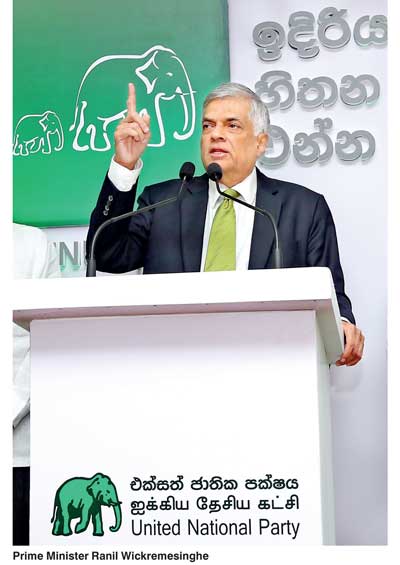Tuesday Feb 17, 2026
Tuesday Feb 17, 2026
Saturday, 13 May 2017 00:00 - - {{hitsCtrl.values.hits}}
By P. Radhakrishnan
The book titled ‘Ranil Wickremesinghe - A Political Biography’ by Dinesh Weerakkody is an excellent narration of the political journey of a four-time Prime Minister. The book in very simple language portrays the strength of character and perseverance of a statesman who has weathered many storms.
This biography of Prime Minister Ranil Wickremesinghe is a must-read for anyone seeking to hold high political office in Sri Lanka. It shows the Prime Minister at his soaring heights and tragic depths, and reminds us that heroes are also flawed human beings.
Dinesh beautifully recounts Ranil’s entry and rise. A few chapters in the book read like a novel in their retelling of some of the most important decades in Sri Lankan history, and our current and future leaders should be able to apply its lessons over and over again to prevent history repeating itself.
But some of the most fascinating points in the book are the references that are made to leaders like Dudley Senanayake. Leaders on the other end of the spectrum—the ones you probably didn’t dwell on in history class too much while studying their leadership qualifications. These leaders didn’t insist on their own infallibility or claim exclusive power over policy decisions. And yet they pulled off incredible feats of leadership simply by working with others and seeking advice when they needed it.
Though the myth of the strong leader is about political leadership, you come away from Dinesh’s analysis with a deeper understanding of leadership in general. Dinesh highlights how dangerous it can be when leaders make decisions alone—and how much good comes about when they work together. Dinesh also highlights why leaders should challenge themselves, bring in fresh thinking and expert advice, and not only invite but seriously consider opposing viewpoints and public opinion without depending only on friends and relatives.
Dinesh highlights on page 181 paragraph two that one of the Prime Minister’s outstanding weakness is “his tendency to gather around him his close friends of years gone by, who have done very little to help him when he was in the political wilderness, but flock around him when he is in power”, something which he says “has drawn justified criticism from many quarters.”
He further states: “Let us hope for the sake of the country those people entrusted with key institutions deliver or go home.”
This is very relevant today given the growing unhappiness in the country on some fronts for want of leadership direction and improvements in the living standards of average Sri Lankans.
Dinesh’s respect for the Prime Minister is very deep, a person for whom he has worked for 25 years as a volunteer and whose ear he has. He says on page 182 paragraph 1: “We are fortunate to have a political leader such as him to lead the country. Rather than try to pull him down, people of goodwill and influence should stretch out their hands to support him in taking this country forward so that it can be a leading nation in the region.”
He goes on to say: “His ideas for the country, what he has negotiated internationally and his forward thinking, are of course unmatched, and if one compares it with the previous ten years, one can see the yawning gap between the intellectual ability of the past, which was virtually nil, against his present thinking.”
The Prime Minister must therefore not betray the trust people have placed in him. It is time to clean the house and set a new direction more consistent with the Government’s promise to change the way it operates and deliver on the promises made.
Ranil Wickremesinghe is one of the few leaders with a genuine liberal mindset and therefore he is the best man to provide leadership for a true Sri Lankan identity that respects all communities and religions. People today are sick of communal politics!
(The writer is a former MP and Deputy Minister of Vocational and Technical Training).